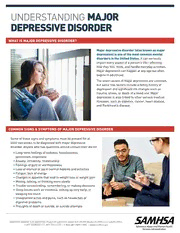
Understanding Major Depressive Disorder PDF
Preview Understanding Major Depressive Disorder
UNDERSTANDING MAJOR DEPRESSIVE DISORDER WHAT IS MAJOR DEPRESSIVE DISORDER? Major depressive disorder (also known as major depression) is one of the most common mental disorders in the United States. It can seriously impact every aspect of a person’s life—affecting how they feel, think, and handle everyday activities. Major depression can happen at any age but often begins in adulthood. The exact causes of major depression are unknown, but some risk factors include a family history of depression and significant life changes such as trauma, stress, or death of a loved one. Major depression is also linked to other serious medical illnesses, such as diabetes, cancer, heart disease, and Parkinson’s disease. The subject in this photo is a model for illustrative purposes only. COMMON SIGNS & SYMPTOMS OF MAJOR DEPRESSIVE DISORDER Some of these signs and symptoms must be present for at least two weeks to be diagnosed with major depressive disorder. Anyone who has questions should consult their doctor. • Long-term feelings of sadness, hopelessness, pessimism, emptiness • Anxiety, irritability, restlessness • Feelings of guilt or worthlessness • Loss of interest or joy in normal hobbies and activities • Fatigue, lack of energy • Changes in appetite that lead to weight loss or weight gain • Moving, talking, or thinking more slowly • Trouble concentrating, remembering, or making decisions • Sleep issues such as insomnia, waking up very early, or sleeping too much • Unexplained aches and pains, such as headaches or digestive problems • Thoughts of death or suicide, or suicide attempts The subject in this photo is a model for illustrative purposes only. SAMHSA’s mission is to reduce the impact of substance abuse and mental illness on America’s communities. 1-877-SAMHSA-7 (1-877-726-4727) • 1-800-487-4889 (TDD) • www.samhsa.gov Substance Abuse and Mental Health Services Administration TYPES OF MAJOR DEPRESSION THERE ARE SEVERAL TYPES OF DISORDERS THAT FALL UNDER MAJOR DEPRESSIVE DISORDERS: Postpartum Depression Psychotic Depression Seasonal Affective Disorder Melancholic Depression affects women after is a form of depression is a mood disorder directly is a form of depression childbirth and causes with psychosis that may caused by the time of the in which people exhibit a extreme anxiety and include delusions and/ year, most often occurring complete loss of pleasure sadness, making it or hallucinations where in the winter months in all or almost everything. difficult for mothers to the person is both when sunlight is not as care for themselves and/ depressed and out of readily available. or their babies. touch with reality. TREATMENT Even the most severe cases of depression can be treated with medication, therapy, or both. And the earlier a person begins treatment, the more effective it is. Treatment for major depression, just like hypertension, diabetes, and heart disease, requires long-term management of symptoms. • M edication: Antidepressant medicines may help improve the way a person’s brain controls mood or stress and reduce symptoms. Antidepressants usually take two to four weeks to take effect. Sleep, appetite, and problems concentrating often improve before a noticeable mood shift, so it is important to give medication a chance to work. • Therapy: Talking to a mental health professional is effective in helping people identify triggers, create positive behaviors, manage stress, set goals, and stick to a treatment plan. The subject in this photo is a model for illustrative purposes only. NEED HELP OR MORE INFORMATION? If you or someone you know has major depressive disorder, these resources can help. Visit SAMHSA’s Early Serious Mental Treatment Locator and Behavioral Health Treatment Locator at SAMHSA.gov. Or, call SAMHSA’s National Helpline at 1-800-662-HELP (4357) or 1-800-487-4889 (TDD). Learn more at SAMHSA.gov/Serious-Mental-Illness SAMHSA’s mission is to reduce the impact of substance abuse and mental illness on America’s communities. 1-877-SAMHSA-7 (1-877-726-4727) • 1-800-487-4889 (TDD) • www.samhsa.gov Substance Abuse and Mental Health Services Administration
